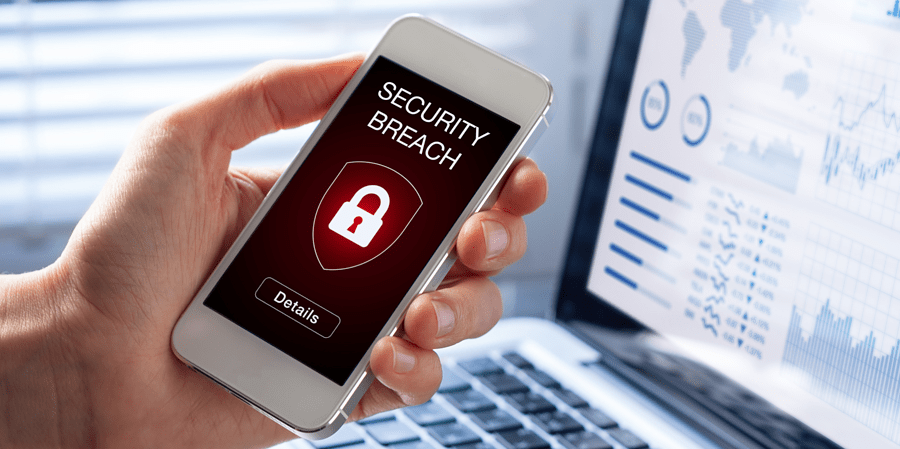Individuals, small businesses, large businesses, and even governments are frequent targets of cyberattacks in the form of ransomware, phishing, stolen devices, malware, or insider theft. Typically, larger businesses have a department dedicated to maintaining a shield of protection from cyberattacks. Small businesses are perceived as an easier target by hackers because they tend to lack robust IT infrastructure. According to a 2022 UpCity report, 58% of small businesses reported experiencing a cyberattack. With cyberattacks on small businesses rising, it is important to be able to identify possible threats before they happen and know how to prevent theft. Below are five tips to protect your small business from cyberattacks and phishing scams.
#1 Opt in to multi-factor authentication
Far too many individuals and small businesses choose not to opt into multi-factor authentication because of the inconvenience. However, it’s important to consider just how inconvenient data theft could be relative to one extra step when logging into accounts. The added step of a verification email or text is much simpler than the process of regaining access to accounts, banking, client data, or other vital information being exposed to hackers.
Opting into multi-factor authentication is one of the simplest and most proactive ways to protect your small business from cyberattacks. Data thieves will have a much harder time hacking your accounts when logging in requires verification from one of your personal devices. Multi-factor authentication also provides a notification to you and your team when an attempt to gain access to your account has been made, giving you the opportunity to get ahead of the hacker by changing passwords and contacting the software or app.
#2 Pause before you click
Even just five years ago, phishing attempts were much easier to spot than they are today. Years ago, receiving a message from a “prince” or an email with poor grammar and distorted logos was an easy giveaway. Today, phishing emails, calls, and text messages can sound and look almost identical to the authentic source. Phishing scams accounted for 20% of cyberattacks pre-covid.
Before you click on a link or respond to an email, take a moment to ask yourself.
- Were you expecting the email?
- Do you have a dedicated point of contact within the organization who you should be hearing from?
- Is the sender demanding payment or vital business information with threats?
- When you hover over the link, does the destination look legitimate?
- Is the sender’s email in the proper format for the organization?
When in doubt, reach out directly to the business or vendor to confirm that the information being requested is indeed genuine. Trust your instincts—if something feels off, don’t click or provide the information.
#3 Know the risks and remain on your toes
Doing business in a digital world comes with risks. That’s not to say you should remove your business from the digital space, but you do need to remain on your toes and make data security a priority. Small businesses are a target of many scammers and cyberattacks due to their lack of security protocols and processes.
We recommend that our clients understand the importance of data security, develop protocols, and regularly update passwords and system security tools. Develop internal processes, such as requiring password changes every thirty days, and ensure apps and software are regularly updated to their most current versions as these updates frequently include security patches.
#4 Know your suppliers’ security processes
While establishing security protocols for your own business, don’t neglect those with whom you do business. This includes suppliers and vendors, contractors and freelancers, and any other business that would have access to or need your business’s vital information. Although a vendor or supplier will not have access to your complete data, they will most likely have your payment information on file, leaving you exposed to bank or credit card theft.
#5 Choose software that provides a higher level of security
Chances are you are using a variety of apps, software, and other digital tools to run your business. Before you sign up for another service or plugin that allows the third-party app access to your business data, investigate their security protocols. What are they doing to protect the data they have access to? They may offer many of the same things we recommend for your business: multi-factor authentication, requiring regular password changes, cyber walls, or other advanced data protection tools.
Our clients trust that we recommend only the best cloud-accounting applications, not only to improve their back-office accounting processes but also to ensure that their data is secure within those apps. Xero, our top recommended cloud-accounting app, provides top-level security in order to protect small businesses from ransomware attacks. Xero is certified as compliant with ISO/IEC 27001:2013, the premier global information security management system (ISMS) standard. They protect small business data with multiple layers of security, encrypting information and replicating it in several locations online, keeping data safe while making it available when you need it.
Other top recommended cloud-accounting apps for small businesses with advanced data security include:
A cyberattack can cost your business time and money. In 2021 alone, the FBI received nearly 20,000 complaints from businesses with email compromise scams and attacks, reporting losses of about $2.4 billion according to the FBI Internet Crime Report. The money lost alone is enough to take down a business, but there is also the downtime of recovering accounts and reputation damage when client data is also exposed.
Be proactive about data security, establish internal protocols, know who you are doing business with, and remain up-to-date with scam alerts and software updates. Your business data is only as safe as where you store it. If you need assistance choosing which cloud accounting app is right for your business, and ensuring your data is safe, send our team a message.

